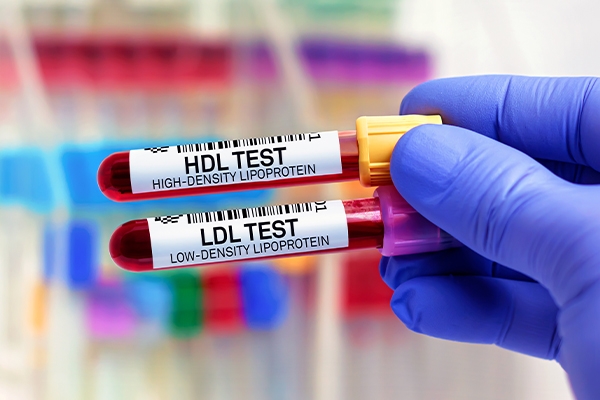When Should Cholesterol Be Checked?

Changes in diet and lifestyle can help you keep your cholesterol under control. If this does not work, you may need to seek medical attention.
When someone is between the ages of 20 and 30, they are most likely focused on their profession and income. There are no health concerns arising from eating various fried foods, boba beverages, or coffee. You're all voracious eaters, but you never get sick or experience any symptoms.
Is it true, however, that we can disregard the food and drink we consume simply because we feel fine? Regardless of your age, try to get a cholesterol test. You don't have to wait until you're in your forties to start. Knowing how high your cholesterol is early on has several long-term benefits. Yes, high cholesterol levels have an impact on long-term health, particularly heart health.
What is cholesterol?

Cholesterol is a type of fat that the body produces. Derived from two sources: the heart and animal foods such as meat, poultry, and dairy products. However, a diet heavy in saturated and trans fats causes the liver to create more cholesterol than it should.
The body needs cholesterol to produce cells, as well as vitamin D and hormones such as estrogen, testosterone, and adrenals. Cholesterol also creates bile acids, which aid in fat digestion and nutrient absorption.
Too much cholesterol can lead to the clogging of blood vessel walls. Because cholesterol obstructs blood flow to the heart and brain, this condition leads to heart disease and stroke.
When should you have your cholesterol checked?
Statin therapy is one of the cholesterol tests recommended by doctors to normalize LDL (low-density lipoprotein) levels. Statins are HMG-CoA inhibitors that reduce blood vessel oxidative stress and inflammation.
Statin therapy and dietary adjustments are thought to be effective strategies for lowering high cholesterol to a healthy level. However, a person's cholesterol level is not simply determined by how they feel, such as frequent tingling, stiffness in the neck and shoulders, disorientation, or fat lumps on the eyelids.
A screening blood test is required to help diagnose it. Thus, it's critical to get cholesterol evaluated early—even in children and teens. Healthy adults should have their cholesterol checked every 4–6 years.
Meanwhile, people with heart disease, diabetes, or a family history of high cholesterol should do it more frequently.
Procedure for taking a cholesterol test

The medical staff will ask you to fast for 9-12 hours prior to the test. Some cholesterol tests, however, involve no fasting. Simply follow the medical team's directions.
During the test, the medical staff will draw blood from a vein—typically an arm vein. The medical staff will clean the injection site with an antiseptic before administering the needle. The needle was removed, and the injection site was plastered over. This process is quick, painless, and does not interfere with your daily activities.
This cholesterol test is used to check levels of:
- Low-density lipoprotein (LDL), or "bad" cholesterol. The optimal LDL levels are <100 mg/dL. Having high levels of LDL cholesterol can lead to plaque buildup in the arteries and heart disease or stroke.
- High-density lipoprotein (HDL), or "good" cholesterol. It is "good" because, at high levels, it can reduce the risk of heart disease and stroke. The optimal HDL level is >60 mg/dL.
- Triglycerides, a type of fat in the blood that the body uses as energy. The combination of high triglyceride levels with low HDL cholesterol or high LDL cholesterol levels can increase the risk of heart attack and stroke. The optimal triglyceride level is <150 mg/dL.
- Total cholesterol, the total amount of cholesterol in the blood based on HDL, LDL, and triglyceride numbers. The optimal total cholesterol level is < 200 mg/dL.
High cholesterol levels are typically caused by a number of variables, including age, smoking habits, a lack of physical exercise, being overweight or obese, family history, and bad dietary habits.
Tips for avoiding high cholesterol

What if the test results show elevated cholesterol levels? Having normal cholesterol is not a pipe dream. We can acquire it by eating properly and modifying our lifestyle. The following diet is recommended to maintain cholesterol levels:
- Increase your consumption of fruits and vegetables. Limit salty items like chips. Limit your intake of biscuits, cakes, and bread.
- Select nonfat milk.
- Choose a range of healthful proteins, such as lean meats, chicken, shellfish, legumes, nuts, and seeds.
- Limit your red meat consumption to three times each week.
- Choose fatty fish like salmon, sardines, and mackerel. At least twice per week.
- Choose healthy fats like nuts, seeds, avocados, and olive oil.
- Limit your salt intake. Cook using herbs and spices.
Lifestyle adjustments can also help lower cholesterol and triglyceride levels. Some of the tasks you must do are as follows:
- Don't smoke. Smoking enhances LDL cholesterol's capacity to enter the arteries and cause damage.
- Get some exercise on a regular basis. Exercise raises HDP while decreasing LDL and triglyceride levels.
- Get rid of excess weight or body fat. Being overweight raises triglyceride and LDL levels.
- Control the blood sugar levels. Blood sugar levels have been related to an increased risk of atherosclerosis (artery hardening), heart attack, and stroke.
What if it's not enough?

Some people find that modifying their diet and lifestyle is insufficient. This means they will require medication to treat their high cholesterol levels, which are sometimes inherited from their parents.
Doctors will prescribe statins to reduce LDL levels, the cholesterol produced by the liver, and instead utilize the cholesterol in the circulation. If statins do not sufficiently decrease cholesterol, you may require extra medications. Statins might cause muscle soreness in some people. Even if you are on medical treatment, nutrition and exercise are still crucial.
High cholesterol triggers many kinds of illnesses, including heart disease, stroke, and peripheral vascular disease. Unfortunately, lots of people with high cholesterol are unaware of their disease due to the absence of symptoms. Knowing the symptoms of elevated cholesterol can help you start to maintain a healthy heart.
If you have any of the above symptoms and want to seek treatment, go to Consult a Doctor.



